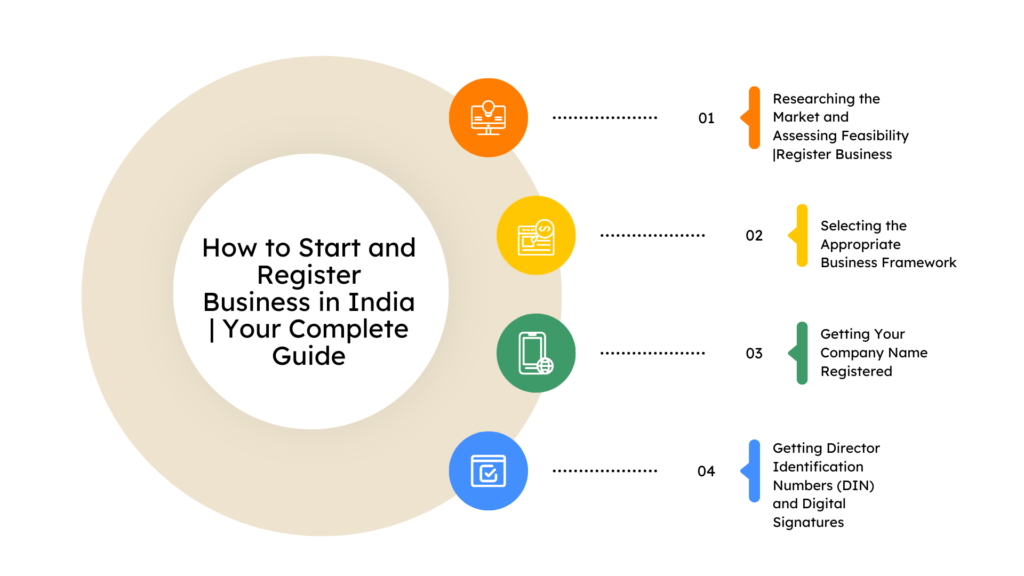Over the past few decades, India’s economy has changed significantly, making it one of the most desirable places for entrepreneurs to register business in India. Establishing a business in India is an exciting opportunity due to the country’s growing consumer base, favorable demographic dividend, and government efforts that support corporate growth and innovation. However, registering a business in India can be a complicated procedure that requires several processes and compliances. This guide will help you successfully register a business in India by guiding you through the necessary stages, important factors, and insightful advice. It will also emphasize the significance of business set up services for a seamless process.
Step 1: Researching the Market and Assessing Feasibility |Register Business
Investigating the market and determining viability are the initial steps in launching a business in India. This includes determining your target market, evaluating the competitive landscape, determining the level of demand for your goods or services, and evaluating the regulatory environment. For instance, it’s essential to comprehend the particular compliance standards if you’re entering a highly regulated field like finance or pharmaceuticals.
Utilizing digital tools like Google Trends, social media analytics, online surveys, and conventional market research techniques can yield insightful data on consumer behavior and industry trends. This information can assist you in choosing the right business structure and location for your activities and direct your business strategy.
Step 2: Selecting the Appropriate Business Framework
Choosing the right business structure is among the most important choices made during the Indian company registration process. Your level of control over the business, as well as your legal and tax responsibilities, will be determined by the structure you select. The following are the primary forms of business structures in India:
- Sole Proprietorship: Small firms with a single owner should consider the sole proprietorship. It’s simple to set up, but it doesn’t allow the owner to keep their assets separate from their business assets, which makes it dangerous.
- Partnership Firm: Fit for companies with two or more proprietors. It provides shared accountability and entails a partnership agreement. Nonetheless, partners are personally responsible for the company’s debts.
- Limited Liability Partnership (LLP): The advantages of a business and a partnership are combined in a limited liability partnership (LLP). Due to restricted liability, partners’ private assets are safeguarded.
- Private Limited Company (Pvt Ltd): The most popular structure for medium-sized to large-sized organizations is the private limited company (Pvt Ltd). It can draw investment, provides quick ownership transfers, and has limited liability. It does, however, require stricter adherence to regulations.
- Public Limited Company: A public limited company is a good option for big companies trying to raise money from the general public. Although it offers limited liability, it is subject to stringent restrictions set forth by the Securities and Exchange Board of India (SEBI).
- One Person Company (OPC): A more recent idea, the One Person business (OPC) was unveiled by the Companies Act of 2013 and permits one person to establish a limited liability business.
Every structure has advantages and disadvantages, so selecting one that fits your company’s objectives, size, and long-term vision is critical. Making an informed choice might be aided by contacting business set up services or legal and financial professionals.
Step 3: Getting Your Company Name Registered
Selecting and registering your business name comes next after deciding on the form of your enterprise. The name needs to be distinctive, accurately convey your brand, and adhere to the Ministry of Corporate Affairs (MCA) naming regulations. You must apply for name approval and verify that your suggested name is available on the MCA portal if you are a Private Limited Company or LLP.
A brief business description and up to two possible names must be submitted with an application for the name to be approved. If the name satisfies the requirements, the Registrar of Companies (ROC) will assess the application and authorize it. This stage is very important since the approved name will be used in all upcoming business documents and branding.

Step 4: Getting Director Identification Numbers (DIN) and Digital Signatures
Getting Director Identification Numbers (DINs) and Digital Signature Certificates (DSCs) is the next essential step in the Indian business registration process, notably for companies and limited liability partnerships. A DSC is necessary to electronically sign the several documents needed for registration. It guarantees the integrity and authenticity of the papers uploaded online.
A special identifying number known as the DIN is given to every director of the business. Anyone who wants to be appointed as a director in an Indian firm must do this. The MCA portal is the preferred method of filing the DIN application. It normally calls for the submission of identity and address verification documents.
Step 5: Getting the business registered with the Ministry of Corporate Affairs (MCA)
The next step is to register the business with the Ministry of Corporate Affairs (MCA) in India when the business name has been approved and the DSCs and DINs have been obtained. The process for incorporating Private Limited Companies, LLPs, and OPCs entails submitting the following documents:
- Memorandum of Association (MOA): The company’s goals, range of operations, and relationship with its shareholders are described in the Memorandum of Association (MOA).
- Articles of Association (AOA): The company’s internal rules and regulations that regulate its operations are defined in the Articles of Association (AOA).
The MCA site must be used to submit these documents and any other necessary paperwork to the ROC. After reviewing the application, the ROC will issue a Certificate of Incorporation if all the requirements are met. This certificate is official documentation confirming your company can operate after being duly registered.
Step 6: Registering for PAN, TAN, and GST
Getting a Permanent Account Number (PAN) and a Tax Deduction and Collection Account Number (TAN) from the Income Tax Department comes next after the business is formed. While the TAN is necessary for withholding and collecting taxes at the source, the PAN is necessary for all financial transactions and tax filings.
In addition, you have to register for Goods and Services Tax (GST) if your company’s yearly turnover is more than the specified amount. Businesses that provide goods or services are required to register for GST, which entails completing regular returns and adhering to GST requirements.
Step 7: Creating an Account at a Business Bank
You can open a business bank account once you have the PAN and the incorporation documentation. A separate bank account is required to handle business funds, collect payments, and accept income. Additionally, it aids in keeping accurate financial records, which are essential for financial reporting and tax compliance.
Think about things like the bank’s standing, level of customer care, and availability of business-friendly banking options when selecting a bank. Working capital loans, foreign exchange management, payment gateways, and other specialized business set up services are provided by some banks and might be advantageous to your company.
Step 8: Adherence to Other Regulations and Labour Laws
Businesses operating in India are required to abide by a comprehensive set of labor laws, which cover topics such as minimum salaries, working hours, employee benefits, and safety standards. You might have to register with the Employees’ Provident Fund Organisation (EPFO) and the Employees’ State Insurance Corporation (ESIC), depending on the type and scale of your company.
Furthermore, for enterprises to legally exist, they need to have particular licenses and permits in fields like food, healthcare, and education. Before starting operations, all required approvals must be obtained. Services for business setup can help you navigate these regulations and make sure you’re fully compliant with Indian law.
Step 9: Intellectual Property (IP) Protection
It is essential to secure your intellectual property in today’s cutthroat economic world. Strong IP protection regulations are available in India; by registering your patents, trademarks, and copyrights, you may prevent infringement on your innovations and protect your brand. To register intellectual property, one must follow the established protocols and submit applications to the appropriate authorities, such as the Controller General of Patents, Designs, and Trademarks.
Step 10: Making Use of Government Programs and Rewards
To encourage entrepreneurship and draw in foreign investment, the Indian government has launched several programs and incentives. For qualifying entrepreneurs, programs such as Startup India provide advantages like cash support, tax exemptions, and streamlined compliance procedures. Furthermore, companies in the manufacturing and other priority sectors can benefit from financial support, subsidies, and other advantages thanks to sector-specific incentives like those offered by the Made in India initiative.
Conclusion
In India, establishing and registering a business is a complex procedure that calls for meticulous preparation, adherence to laws, and strategic decision-making. Even though the Indian market has a lot of promise, first-time business owners and foreign investors may find it difficult to navigate the regulatory environment. Here’s where business setup services come into play while you register business in India!













